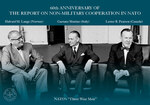News
| Date | Title | |
| 23 Oct. 2020 |  | In compliance with regulations issued by the NATO Office of Security in response to the COVID-19 pandemic, NATO Archives events and services at NATO HQ that are open to the public have been suspended until January 2021. Unfortunately, onsite research visits are included in this category so the NATO Archives is regretfully not accepting visitors to its Reading Room until further notice. |
| 11 Mar. 2020 |  | In light of the COVID-19 situation, the NATO Archives Reading Room will be closed to all external visitors and researchers until further notice. |
| 05 Mar. 2020 |  |
NATO Declassified: Documents related to the Non-Proliferation Treaty are publicly disclosed March 5, 2020 marks the 50th anniversary of the entry into force of the Treaty on the Non-Proliferation of Nuclear Weapons (NPT). |
| 05 Mar. 2020 |  |
NATO Declassified: Documents related to the Non-Proliferation Treaty are publicly disclosed March 5, 2020 marks the 50th anniversary of the entry into force of the Treaty on the Non-Proliferation of Nuclear Weapons (NPT). |
| 20 Feb. 2020 |  | In 2020, the Reading Room of the NATO Archives will be open regularly from Monday to Friday. Only a limited number of spaces are available per day, so please contact the NATO Archives with tentative dates as soon as possible. |
| 19 Jan. 2017 |  |
The NATO Archives marks the 60th Anniversary of the Report on Non-Military Cooperation The end of 2016 saw the NATO Archives fully implicated with events commemorating the 60th anniversary of one of the most important texts in the history of the Alliance. Approved by the North Atlantic Council on 13 December 1956, the Report on Non-Military Cooperation in NATO is a landmark document whose principle recommendations laid the foundation for NATO’s evolution toward increased political consultation amongst its Allies. |
| 23 Nov. 2016 |  |
The NATO Archives revisits the Hungarian Revolution on its 60th anniversary At the request of the Hungarian Delegation to NATO, the NATO Archives published a softbound collection of publicly disclosed NATO documents to help support the commemoration ceremony for the Hungarian Revolution of 1956 held today at NATO HQ. The publication, titled “NATO and the Hungarian Revolution and Freedom Fight of 1956”, showcases documents dating from 1956-1959 to present the story of NATO’s reactions and responses to the dramatic events that were unfolding in Hungary. |
| 09 Dec. 2015 |  |
“The Grandmother of Kabul” pays a special visit to the NATO Archives The 2015 Archives Committee meeting held at NATO HQ in Brussels provided an appropriate setting to welcome an extraordinary guest. International archivist and activist Nancy Hatch Dupree, affectionately known as the “Grandmother of Kabul”, was invited by the NATO Archives for two special speaking engagements to share her experiences about the establishment of the Afghanistan Centre at Kabul University (ACKU). Home to Afghanistan’s most comprehensive collection of historical documents and artefacts, the ACKU represents the culmination of Nancy Dupree’s archival work since she first arrived in the country in 1962. |
| 01 Jun. 2016 |  |
The NATO Archives revisits the Alliance’s international arts heritage As NATO prepares to move to its newest headquarters in Brussels, the NATO Archives took a look back at the Alliance’s international arts heritage with an exhibition featuring the national artworks gifted for the decoration of the first new NATO headquarters built at Porte Dauphine, Paris in 1959. |
| 05 Jan. 2016 |  | The Dayton Peace Agreement (formally known as the General Framework Agreement for Peace in Bosnia and Herzegovina) was signed on 14 December 1995 at the Paris Peace Conference to mark the cessation of hostilities that tore that country apart between 1992 and 1995. It helped usher a new era for the Alliance as new partnerships and peacekeeping became central to NATO’s transition into a post-Cold War environment. |
